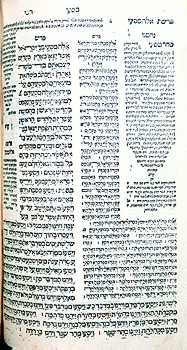


 |
Collection Jacob M. Lowy
Hamishah Humshe Torah. Pentateuque. Perush ha-Torah ... Moshe b.R. Nahman Gerondi, Avraham ben 'Ezra, Rabenu Shelomo. Constantinople : Samuel b. David Nahmias, 1522.
Le livre est ouvert à Ba-midbar (Nombres) 1:1-51, qui relatent les pérégrinations d'Israël, de l'Égypte à Canaan, et qui durèrent quarante ans. La disposition de la page est complexe; on y lit des commentaires de Nahmanide (1194-1270), d'Abraham Ibn Ezra (1089-1164) d'Espagne et de Rashi (1040-1105) de France, qui entourent le texte biblique et le Targum araméen. Ces derniers sont ponctués de signes vocaliques et de cantilation, mais les caractères sont usés. Ces pages reflètent un peu les récentes pérégrinations des communautés sépharades, de même qu'elles nous renseignent sur les pérégrinations d'Israël dans le monde antique.
The book is open to Ba-midbar (Numbers) 1:1-51, which details the itinerary of the forty-year wanderings of Israel from Egypt to Canaan. The page layout is complex with the commentaries of Nahmanides (1194-1270) and Abraham Ibn Ezra (1089-1164) of Spain, and Rashi (1040-1105) of France surrounding the biblical text and the Aramaic Targum. These latter two texts are vocalized and have cantillation signs, but the types appear worn. These pages reflect something of the recent journeys of the displaced Sephardic communities, as much as they tell us about the wanderings of Israel in antiquity.
